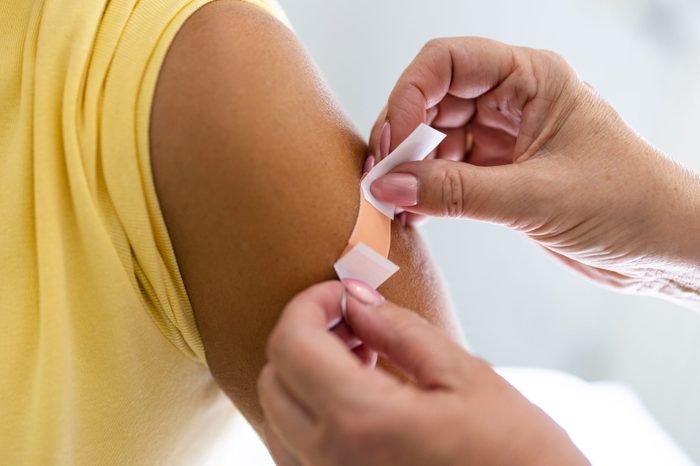Research: Doing This One Thing for 90 Minutes After Your Flu or COVID Vaccine Maximizes Your Immunity
Updated: Jan. 26, 2024

It's perfect to get this in before you take a day to rest and let your immune system build up to turbo-mode.
After you get your seasonal vaccinations, an immediate rest can be hard to resist—however, recent research suggests you may want to hold off on that downtime just a little while right after you get poked. (Though we fully support a gentle day following your vaccines!)
A 2022 study from Iowa State University, published in the peer-reviewed scientific journal Brain, Behavior, and Immunity, presents a compelling argument to challenge your body with a bit of activity right after you get your shot.
Exercise for better immunity
The study showed that human participants who committed to 90 minutes of mild- to moderate-intensity exercise—such as cycling on a stationary bike or taking a brisk walk—right after their flu or COVID-19 vaccine generated a notably heightened antibody response in the subsequent four weeks.
In comparison, those who sat or resumed their everyday activities didn’t experience this additional immune boost. The researchers observed parallel outcomes when they conducted a second treadmill experiment, this time with mice.
Marian Kohut, PhD, kinesiology professor at Iowa State and the study’s lead author, comments in a news release from the university: “Our preliminary results are the first to demonstrate a specific amount of time can enhance the body’s antibody response to the Pfizer-BioNtech COVID-19 vaccine and two vaccines for influenza.”
Here’s why this is significant: Antibodies are your defense mechanism against harmful invaders like viruses and bacteria. They are pivotal in the immune response, and vaccines train your immune system to produce them.
4 Just-Revealed Facts as the New COVID-19 Vaccines Are Released
The science on exercise and immunity
Going beyond mere observations, researchers explored the underlying mechanisms. Dr. Kohut points out that numerous changes unfold when you exercise, from metabolic shifts to circulatory alterations. Working out boosts blood and lymph flow, enhancing the circulation of immune cells. As these cells travel through your body, they become better at spotting and tackling foreign entities.
Supporting these findings, their mouse model experiment hinted that interferon alpha—a protein your body produces during exercise—plays a role in producing virus-specific antibodies and T-cells.
The research also highlighted a particular duration of exercise as effective: While 90 minutes showed positive results, a shorter span of 45 minutes did not significantly impact antibody levels. Dr. Kohut hinted at future research that might explore whether the 60-minute mark is a potential sweet spot. For now, 90 minutes generally did the trick.
When Is Flu Season 2023-2024, and How Intense Will It Be?
A boost accessible to all
The study encompassed a broad spectrum of participants, nearly half falling into the overweight or obese BMI range. The emphasis was on maintaining a heart rate between 120 and 140 beats per minute rather than covering a certain distance or keeping a particular pace. This means the findings could apply to individuals across a variety of fitness levels.
We’re not suggesting an ultra high-intensity indoor cycling class or the toughest HIIT class you’ve ever taken, but a 90-minute stroll might be the perfect way to bookend your shot before taking a rest day to recover from any vaccine side effects.
With flu season around the corner and COVID still spiking in cycles, consider pairing your vaccination with an exercise session. Ongoing research emphasizes how daily habits influence health, suggesting that even a brisk walk or bike ride can enhance your resistance to illnesses.
For wellness updates delivered daily, subscribe to The Healthy @Reader’s Digest newsletter and follow The Healthy on Facebook and Instagram. Keep reading:
- Here’s the Arm You Should Get Your COVID Shot In, New Study Finds
- Ice-T Opens Up About His Health, the Drink He Gave Up for Good, and His Unexpected Deal with Dr. Dre
- Over 60 or Pregnant? Then You’ve Got To Know About This New Vaccine, Say Doctors
- Study: Walking Daily Can Reduce Your Diabetes Risk by 74%


















